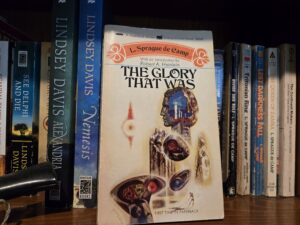
My edition of The Glory That Was is dedicated to Isaac Asimov and boasts an introduction by Robert A. Heinlein. So right up front you have substantial implied attestations of quality. But I’ve learned not to set my sights too high, and tempered my expectations accordingly. I expected an L. Sprague de Camp short novel: smart, droll, erudite, and entertaining, but not grand, emotionally moving, or offering any particularly deep profundity. And that, I’m happy to report, is what I got.
Going in, my expectation was a sort of companion piece to Lest Darkness Fall. After all, the book begins with our hero, Knut Bulnes, and his cowardly, hapless companion ( though, luckily, a classical Greek scholar) Wiyem Flin, pass through a forcefield surrounding the Peloponnese peninsula in pursuit of Flin’s kidnapped wife and find themselves in what appears to be Periclean Athens. But this abrupt change of scenery is about as far as the similarities extend. While the hero of Darkness has indeed traveled back in time, the question is soon raised whether or not our 27th Century protagonist has time-traveled or has merely found himself in a sort of elaborate period recreation.
The 27th Century, it seems, is a sort of Constitutional Empire, with a parliament in New York, and a titular, though largely powerless, emperor. This particular emperor, deems himself the embodiment of such notables as Pericles, Henry the IVth, and FDR. And he’s gone missing. So, while Flin hopes desperately that he has in fact somehow gone back through millennia, Bulnes has his doubts. The two encounter the famous names of the period. Through Socrates, they meet the astronomer Meton and are thus able to take more or less accurate star readings to determine the actual date. At this point the story begins to gradually take on more science-fiction trappings as the two work out what has happened, how, and why while the action and tension mount.
Meanwhile, de Camp is displaying the depth of his knowledge of the history, characters, languages, customs, and architecture of the period. He has fun with the Socratic dialogue and sophists, goes into some detail regarding the discomforts and difficulties of life in ancient times, dispelling some of the romance. In fact, as the book continues, the title comes to bear an increasingly sarcastic meaning.
At 156 pages, it is a short read, but just as long as it needs to be. Rather than a companion piece to Darkness, I found it more similar to Divide and Rule and The Stolen Dormouse, two short de Camp novels that demonstrate the breadth of his imagination, his ability to invent novel settings and social/governmental structures. He wasn’t a writer tied to genre conventions. To sum up, good stuff; I liked it. And give yourself a moment to ponder the ending.
Once you’ve read it yourself, you might find yourself short of reading material again. How about something of mine?

1 comment